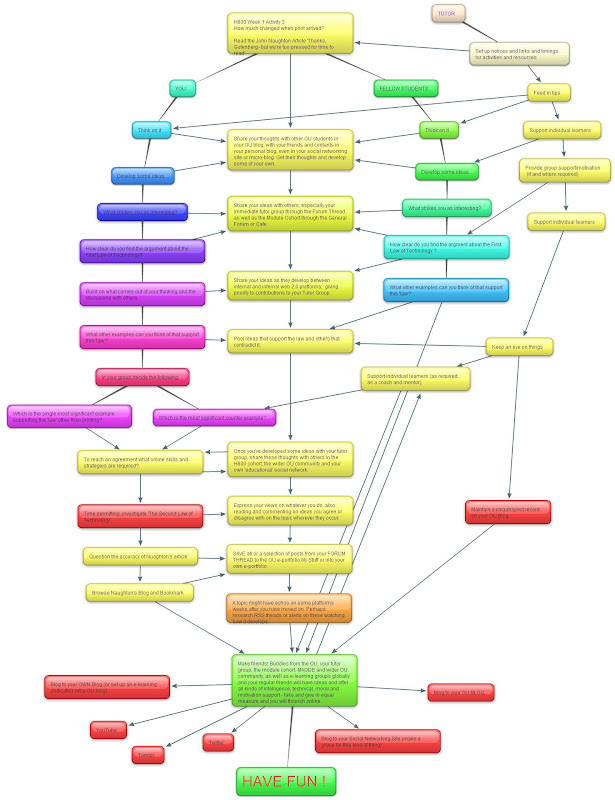Gagne (1970 pp29-30) suggests that instruction in an organized group discussion develops the use and generalizaton of knowledge – or knowledge transfer. Oxbridge tutors contend that the 'Oxbridge Tutorial' – a weekly, structured micro-meeting of two or three people, achieves this. One student reads out a short essay that the tutor and students discuss.
'When properly led', Gagne continues, 'such discussions, where the knowledge itself has been initially mastered', not only stimulates the production of new extensions of knowledge by students but also provides a convenient means of critical evaluation and discrimination of these ideas. Gagne (ibid).
Forty years on from when Gagne wrote this there are what are meant to be or hoped to be learning contexts where this kind of knowledge transfer through group discussion can still work – or may fail to work – either because the degree of subject mastery between students is too broad or there are too many students, or the wrong mix of students.
For example, in the Open University's Masters of Open and Distance Education (MAODE) between 12 and 16 postgraduate students meet online in a series of strucutured online tutor forums – some of these work, some do not. As these meetings are largelly not compulsory and as they are asynchronous and online, it is rare to have people in them together – the discussions are threaded. What is more, in any tutor group there will typically be a mixture of students who are on their first, their second, third, fourth or even fifth module of the Master's – some of whom, given the parameters offered by flexible and distance learning, may have spread these modules over five years. Then there is the task and how it is set, whether the participants are meant to work alone or collaboratively – the simplest and most frequent model online is an expectation to read resources and share notes and thoughts. However, personal experience over five such modules suggests that the committed engagement of say six people, working collaboratively on a clear set of tasks and activities with a time limit and climactic conclusion of delivering a joint project, works best.
Too many of these online tutorials drift, or fizzle out: too few posts, posts that are two long, fragmented posts linking to pages elsewhere, the indifference of participants, the lack of, or nature of the tutor involvement, excessive and misplaced social chat, or discussing subjects that are off topic ... It depends very much on the mix, inclinations, availability and level of 'knowledge mastery' as to how such online tutorials work out. As well as the eclectic combination of students the role, availability, online and other teaching skills, even the personality of the tutor and of course THEIR knowledge experience and mastery matters.
Just reflect on how such workshops or seminars may work or fail face–to–face – the hunger for knowledge on the topic under discussion, the mix of personalities and the degree to which their experience or level of understanding is the same, at slight or considerable variance, let alone any differences of culture, background, gender or in a business setting – position and the department they have come from.
Ideally the workshop convener, or what the French call an 'animateur' should, assemble or construct such groups with great care, like a director casting actors to perform a piece of improvisation. Different contexts offer different opportunities. As a graduate trainee in an advertising agency six of us were repeatedly assembled, the various departmental specialists and directors playing roles at specific times – bit players in these scenarios. On reflection, stage management by a team in the HR department had been vital. It is therefore 'stage management' that I consider of significant importance when trying to construct such collective learning experiences online in a corporate setting.
CONCLUSION
Know your players, cast with care, give direction, record what goes on and step in to nudge, re–kindle, stop or start conversations or activities.
REFERENCE
Gagne, R (1970) The Conditions of Learning
ADDITIONAL LINKS
The Nine Events - from Kevin the Librarian
Various Models of learning - Illustrated
